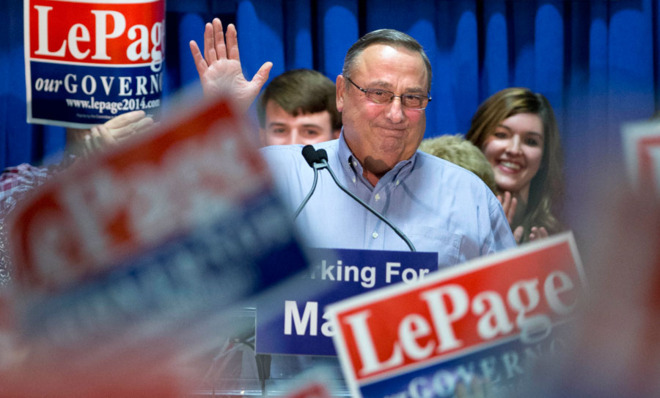Why America needs more politicians like Maine Gov. Paul LePage
Yes, he says outrageous things. Yes, he takes hard-line stances. But he comes from a different place than most American elites — and that's a very good thing.


A free daily email with the biggest news stories of the day – and the best features from TheWeek.com
You are now subscribed
Your newsletter sign-up was successful
Ever since Mitt Romney's "47 percent" disaster-gaffe in 2012, national Republicans have tried to shirk their image as welfare-hating, green eyeshade–wearing budget choppers. Even Paul Ryan, the former head of the congressional Ayn Rand fan club, now talks about expanding the scope of welfare programs to return more of their dependents into productive workers.
But Maine Gov. Paul LePage (R), himself the product of a poor and disordered childhood, is not following the national herd. He's promising more cuts, and not exactly masking his rationale. Last year, he even took up the 47 percent number, saying "about 47 percent of able-bodied people in the state of Maine don't work... It's really bad." The number was wrong, significantly so. But he had staked out a clear position: Many recipients of state aid were undeserving. During his state of the state speech early this year, he said, "Too many Mainers are dependent on government handouts. Government dependency has not — and never will— create prosperity."
Unlike Romney, LePage is not destined to defeat. With an unintended vote-splitting assist from the independent candidate, LePage may yet be re-elected as the most conservative governor in America from one of the most deeply Democratic states. He is hovering around 40 percent of support from likely voters, about even with Democratic opponent Mike Michaud and far beyond the reach of third party candidate Eliot Cutler. Democratic voices are now rising up calling for Cutler to drop out to ensure that the anti-LePage vote isn't split.
The Week
Escape your echo chamber. Get the facts behind the news, plus analysis from multiple perspectives.

Sign up for The Week's Free Newsletters
From our morning news briefing to a weekly Good News Newsletter, get the best of The Week delivered directly to your inbox.
From our morning news briefing to a weekly Good News Newsletter, get the best of The Week delivered directly to your inbox.
Perhaps no American politician of LePage's prominence clings so tenaciously to his political doctrines, and no other figure more closely ties them to his own biography. This is a very admirable thing, and important in a political culture that seems to default to gutless, poll-tested groupthink.
LePage genuinely grew up in poverty in Lewiston, Maine. He was homeless for part of his teenage years. He tripped over the dead body of a sibling in his tenement. One of his first memories is of his father breaking his nose and jaw in a beating. He told the Portland Press Herald (from which these details are culled) in a recent interview that the first day of his real life was when he entered college. "I wouldn't want to live a day before it," he said. "That is where my life started. Before it was nightmares, and to this day, I still have the same nightmares." He can rattle off a list of siblings who have been in jail or prison.
The young LePage received some tough love from surrogate family figures, who taught him basic responsibilities. His whole life seems to have turned on the help of Peter Snowe (husband of Maine's former moderate GOP Sen. Olympia Snowe). But he also benefited from the flexibility of authority figures. After scoring poorly on English verbal tests, he was allowed to take an exam in his mother-tongue, French. That secured his entry into college. His last $900 of tuition before graduation was written off by understanding administrators.
How many other American politicians at the highest levels have a story like this? When LePage talks about "generational" poverty, he does so as both an observer and a survivor. And when he talks about cutting welfare benefits, he often says he is doing so to protect them for a deserving subset of recipients. "We must protect our limited resources for those who are truly in need and who are doing all they can to be self-sufficient," he has said. LePage has sought to reinstitute work requirements for able-bodied people on welfare. It is estimated that only about five percent of Maine's food-stamp recipients don't meet the work requirements.
A free daily email with the biggest news stories of the day – and the best features from TheWeek.com
LePage is a unique case, and there may not be applicable political lessons the national Republican Party can draw from his career. After all, it's not as if GOP mandarins can snap their fingers and create a half dozen other conservative lawmakers with a backstory as astounding and uplifting as LePage's, not to mention one that brings real-life credibility to hardline stances on welfare.
Look, LePage has made plenty of outrageous statements, as liberals have been quick to almost gleefully point out for years. But I find it hard not to wish our political culture allowed in more LePages, from both parties. We need the sharp, hard people who did not pass through every meritocratic institution with ease and a compliant grin. The unsayable word that hides behind most elite criticism of Paul LePage's bearing is "lowborn," an insult that is native to an aristocratic society, not a Yankee one.
Paul LePage is the hot-breathed reminder that the common man will only take so much abuse before he takes the whip hand himself.
Michael Brendan Dougherty is senior correspondent at TheWeek.com. He is the founder and editor of The Slurve, a newsletter about baseball. His work has appeared in The New York Times Magazine, ESPN Magazine, Slate and The American Conservative.
